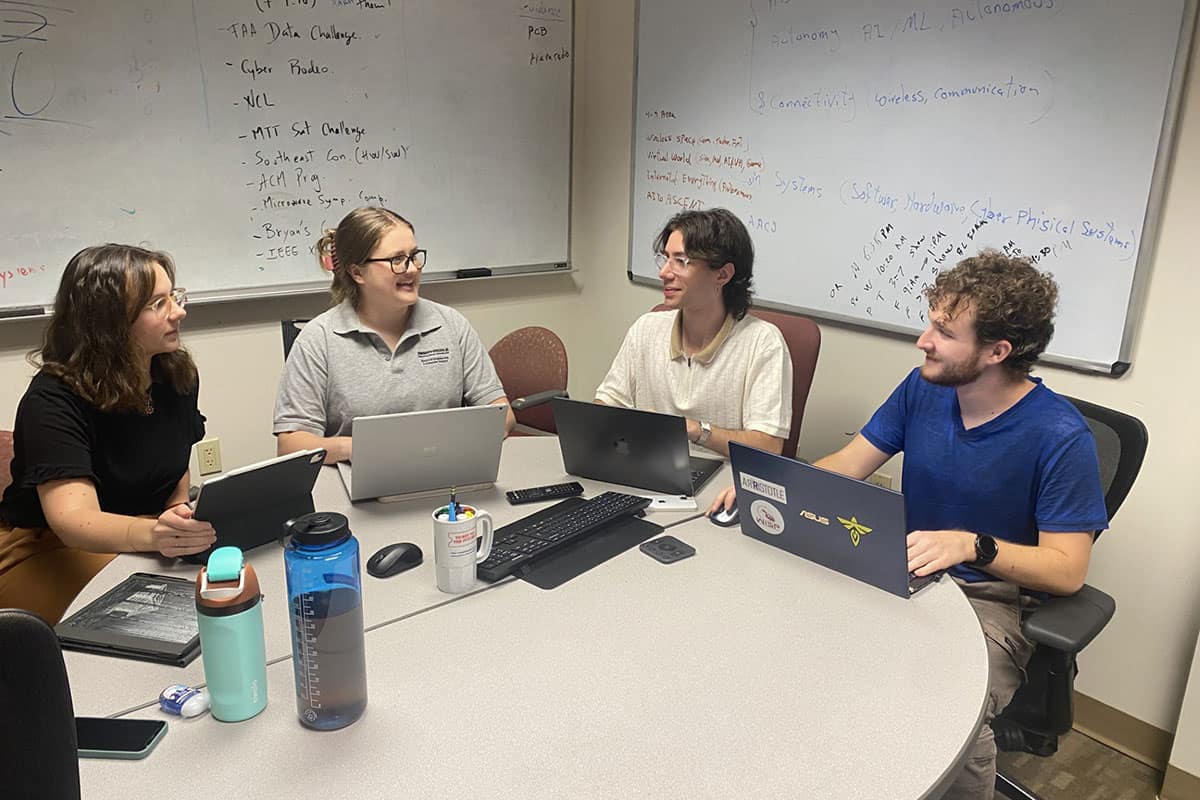Eagle Team Ranks Among Top Ten in FAA Data Challenge

By proposing an artificial intelligence-powered “digital twin” that would map the National Airspace System and provide assistance to air traffic controllers, an Embry-Riddle student team has made it into the top ten in the 2024 Federal Aviation Administration Data Challenge.
Sarah Reynolds, a Ph.D. student in the Department of Electrical Engineering and Computer Science who is the team lead, said her interest in air traffic control began with interactions she had at Embry-Riddle with students in the Air Traffic Management program.
“I became fascinated with the job they are training for,” Reynolds said. “Their job is so complex and so demanding. So, looking at the technology we have available, I was interested in seeing how far we could push our current capabilities to support these highly critical decisions and scenarios.”
The annual FAA contest brings student teams to compete from all over the country. The grand prize is $100,000 and will be awarded to the top team among the ten finalists this spring.
“This is really exciting work that they're doing," said Dr. Omar Ochoa, associate professor in the Department of Electrical Engineering and Computer Science and the team's faculty advisor.
"It's always great to have the chance to apply some of the theoretical work the research group does in a real-life scenario. For the students on the team, both undergraduate and graduate students, this is an invaluable experience, allowing them to learn about cutting-edge techniques. It's also beneficial in that it leverages the school's resources and knowledge and contributes to the aerospace ecosystem,” he said.
Amid a shortage of air traffic controllers, the digital twin project is designed to reduce controller workload and increase the capacity of the national airspace. It also aims to optimize flight plans with regard to fuel usage, flight time and environmental impact, according to the project description.
Daniel Machado, a senior in Software Engineering who is also pursuing a master’s degree in Computer Science, said that the project required the team to immerse themselves “in the aviation domain and to be able to understand the industry’s problems, and how we can identify solutions.”
“This project has not only helped me gain a lot of knowledge and skills,” he said, “but it also serves as an opportunity to tackle complex real-life problems.”
Luke Newcomb, who is earning a master's degree in Software Engineering, said that by participating in the FAA Data Challenge project, “we have been working with systems that the aviation industry actually uses in day-to-day operations.”
Alexandra Davidoff, a graduating senior in Software Engineering, added that the team has worked “to ensure the proposed solution could fit seamlessly into the future air traffic control framework.”
Participating in last year’s FAA Data Challenge, in which Embry-Riddle also came in among the top ten, Reynolds, the team leader, said she realized how much data exists within the aviation sphere. Reynolds’ research focus is on AI, Deep Learning and ensuring that AI “is safe to use in safety-critical systems.”
“Specifically, I’ve been looking at techniques to ensure that human knowledge and logic remain key components of systems, even as we move toward systems that are driven more heavily by generative AI,” she said.
The most valuable aspect of the competition, she said, is getting feedback from experts working in industry and for the FAA.
“One of the most interesting parts of the process for me is the discussions with experts in air traffic control and seeing how we can meet the actual needs of the people who work in the industry,” Reynolds said.
Reynolds sees the project and its use of the bounty of data available in aviation as having great potential.
“While our system plans to use this data to make strides in the effectiveness of flight planning and increasing the sustainability of aviation,” she said, “I know that a system like the one we are proposing can lead to solutions that have yet to be thought of.”

 Michaela Jarvis
Michaela Jarvis